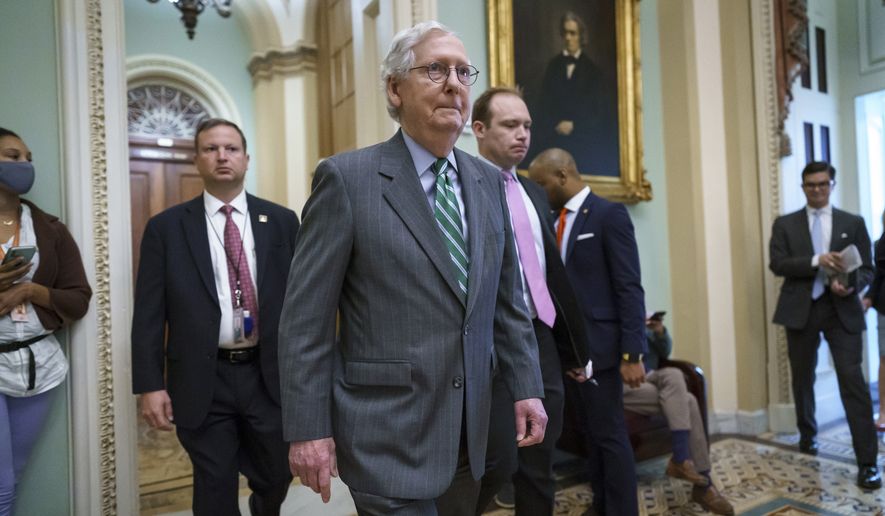Senate Minority Leader Mitch McConnell threw cold water on Democrats’ hopes of finding enough bipartisan support to pass their massive voting bill on Tuesday.
Even as Democrats huddled to discuss whether they could support a compromise measure suggested by Sen. Joe Manchin III, West Virginia Democrat, Mr. McConnell said Republicans would not support it.
“All Republicans, I think, will oppose that as well if that were to be what surfaced on the floor,” he said, as more than a dozen Republicans continued to blast the effort to change voting laws around the country as a Democratic power grab that would lead to more voter fraud.
Democrats are proposing a slew of changes in the nearly 800-page bill, including allowing people who do not have photo IDs to present a sworn statement testifying to their identity, creating public financing of elections, and putting restrictions on redrawing congressional districts to gain a partisan advantage.
While the details haven’t been made public, Mr. Manchin, in the hopes of winning over Republican support, is reportedly proposing changes such as allowing people to show utility bills as identification and making Election Day a federal holiday.
Mr. Manchin’s proposal received a brief boost Thursday morning when former Georgia gubernatorial candidate Stacey Abrams said she would back it.
The support of Ms. Abrams, who has become a darling of the left, raised the chances that Democrats could get behind Mr. Manchin’s proposal. But it also dampened the chances of Mr. Manchin being able to win the 10 Republican votes needed to pass a bill in the Senate.
“When Stacey Abrams immediately endorsed Sen. Manchin’s proposal, it became the Stacey Abrams substitute, not the Joe Manchin substitute,” said Sen. Roy Blunt of Missouri.
Mr. Blunt said he hadn’t seen Mr. Manchin’s proposal, but from what he understood to be in it, it’s “a whole lot like the original version, built on their totally bad foundation of the federal government taking over the structure of elections.”
Senate Majority Leader Charles E. Schumer has said he intends to bring up the Democrats’ bill, titled the “For the People Act,” for a vote on Tuesday. But it was not clear what exactly Democrats will propose. Mr. Manchin said only that Democrats had a “good conversation” as he left a meeting of the caucus Thursday afternoon.
Mr. Blunt, though, doubted that any proposal similar to the version of the bill that passed the House on March 3 would win the 10 Republican votes needed to pass the measure in the Senate.
“The bill is riddled with things that would have a devastating impact on the system. People will lose confidence in the election system,” Mr. Blunt said.
The nearly 800-page proposal is a compilation of changes in elections and voting procedures that Democrats have long sought.
The bill, while not barring states from requiring voters to present photo ID, would allow those without identification to present a sworn statement at the polls that they are who they say they are and that they are eligible to vote.
Mr. Manchin’s compromise proposal would let people present other forms of proof such as utility bills.
But the idea of letting voters present letters instead of a photo ID outraged Republicans such as Sen. Steve Daines of Montana.
“In Montana, we have to produce a photo ID to get a hunting license, to get a fishing license. You produce a photo ID to rent a car. You produce a photo ID to check into a hotel. In Montana it is known as common sense,” he said.
The bill also would require that independent state commissions be allowed to redraw congressional district boundaries. It would set national standards, barring redistricting that favors one party over another or reduces the power of minority groups.
The bill also would allow federal candidates who raise a certain amount of campaign funds through small donations to get a 6-1 federal match for donations under $200. The bill would increase the number of commissioners the White House appoints to the Federal Election Commission from six to seven. That would allow Democrats during the Biden administration to control the agency that enforces election laws.
Republicans have pointed to the bevy of other liberal provisions in the bill and decried the measure as a partisan effort intended only to benefit Democratic candidates.
The bill also guarantees voting rights for felons who have completed their sentences and grants statehood to the District of Columbia.
The debate over the bill comes as Democrats complain that voting changes passed by red states such as Georgia and Texas are aimed at helping Republican candidates.
Mr. McConnell challenged that assertion.
“I’ve taken a look at all the new state laws. None of them are designed to suppress the vote. And there’s no rational basis for the federal government trying to take on all American elections,” he said.
Sen. John Barrasso, Wyoming Republican, said Democrats may say they’re trying to make elections fairer. But he said they just want to seize power.
“The Democrats have basically two big priorities. One is just the regular liberal stuff that you’d expect from them, which is very radical, massive spending, massive tax increases, open borders, undermining American energy,” said Mr. Barrasso, the No. 3 Republican in the Senate. “And then the other is stacking the deck, which really is much more dangerous in their effort to become a permanent majority party. And they do that by their legislation as for members of the Supreme Court. They want to add D.C. as a state with two permanent Democrat senators. And this bill.“
• Kery Murakami can be reached at kmurakami@washingtontimes.com.




Please read our comment policy before commenting.